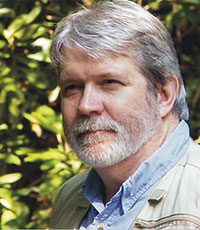By David Ramsey
Would you consider yourself to be a tree hugger? Off hand, I’m guessing there aren’t too many readers of this magazine who would identify themselves as such. I’m also guessing lots of our readers are just fine being called a conservationist. Others, maybe not so much. The whole conservationist vs. “environmentalist” controversy really only serves to reduce the vital issue of protecting and conserving our natural world down to a matter of labels. And, as we know, sometimes a label is just a lie with a name badge. Labels divide people, hold them back from doing good things, hinder critically important work.
I’ve spent most of my adult life advocating for conservation of our natural resources. I’ve worked with folks with highly diverse interests and backgrounds, from left-wing, hard-cores to self-serving politicians and dishonest corporate types who pretend to care about the natural world as long as it pulls in votes and/or boosts their bottom lines. But it’s the authentic “regular people” I’ve worked with, especially the passionate outdoor enthusiasts, sportsmen/sportswomen and committed conservation supporters, who typically make the good (and sometimes big) stuff happen. These are the people for whom conservation is just part of who they are.
Through those people, I’ve learned there are as many different kinds and levels of involvement in conservation as there are in any other important area of human concern. Whether the contribution is simply through the purchase of that hunting/fishing license every year, volunteering for a stream clean-up, involvement with a sporting or conservation group or any of the dozens of other forms of conservation service, we can and do have an impact.
The key to making a positive impact depends on our level of personal awareness and concern. And, in my opinion, a high degree of awareness is a requirement for us to be able to call ourselves “the reasoning species.” Otherwise, we’re just ignorantly passing through time—gas in the tank, beer in the Yeti and the kind of world we leave our kids, their kids and theirs after them be damned.
We don’t have to be radicals, professionals, elected officials or any kind of “als” to make an impact. We simply need to care enough to rise above the BS, ego trips and name calling, work a little to find that common ground with other stakeholders, then go freakin’ make things better! I know because I’ve seen it and helped to make it happen more than once.
Twenty years ago, few people dared to imagine that a valuable, privately owned, 10,000-acre tract of Appalachian Mountain land, endowed with wild trout streams, spectacular 50-mile views, prolific wildlife and even a section of the Appalachian Trail—all surrounded by national forest lands—would be saved from the developer’s dozers by groups and individuals who otherwise believed they had very little in common with each other and often deployed their labels. Yet, along with the extraordinary Rocky Fork Watershed, you and I and the whole world ultimately became beneficiaries of one of the greatest conservation victories and examples of grass roots collaboration to happen in the Southern Appalachians in half-a-century.
During the long campaign to save Rocky Fork, trout fishers, mountain bikers, bear, turkey and grouse hunters, conservationists, horseback riders, hikers and many others literally stood shoulder to shoulder telling congressmen and other decision makers that this watershed was simply too important, for too many reasons, to be locked up and largely destroyed behind the gates of a massive, private resort.
A priceless natural treasure was the common ground, and aware, concerned people came together and made an impact that conserved and protected it—for each other, for the world and for the future.
David Arthur Ramsey is an outdoor photographer, writer and conservationist, born and raised in the mountains of northeastern Tennessee. His outdoor writing and photography have been published locally, regionally and nationally and are most often associated with work to preserve and protect threatened lands and waters throughout the Southern Appalachian Mountains. Field and Stream Magazine and Toyota Motor Company named David the National Hero of Conservation in 2011 for his leadership in saving the 10,000-acre Rocky Fork watershed in northeastern Tennessee. His newly published book, Rocky Fork: Hidden Jewel of the Blue Ridge Wild, tells the story, through his rich photography and his first-hand account, of the more than decade-long battle to preserve this Appalachian and American treasure.
